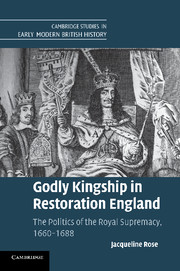Book contents
- Frontmatter
- Contents
- Acknowledgements
- Abbreviations and conventions
- Introduction The Restoration, the Reformation, and the royal supremacy
- Chapter 1 Foundations and legacies: the Reformation and the royal supremacies, 1530–1660
- Chapter 2 The crown and the cavalier Anglicans: prerogative, parliament, and ecclesiastical law
- Chapter 3 Spiritual authority and royal jurisdiction: the question of bishops
- Chapter 4 Dissenters and the supremacy: the question of toleration
- Chapter 5 Anticlericals and ‘Erastians’: the spectre of Hobbes
- Chapter 6 Catholics and Anglicans: James II and Catholic supremacy
- Conclusion
- Bibliography
- Index
Chapter 4 - Dissenters and the supremacy: the question of toleration
Published online by Cambridge University Press: 05 July 2011
- Frontmatter
- Contents
- Acknowledgements
- Abbreviations and conventions
- Introduction The Restoration, the Reformation, and the royal supremacy
- Chapter 1 Foundations and legacies: the Reformation and the royal supremacies, 1530–1660
- Chapter 2 The crown and the cavalier Anglicans: prerogative, parliament, and ecclesiastical law
- Chapter 3 Spiritual authority and royal jurisdiction: the question of bishops
- Chapter 4 Dissenters and the supremacy: the question of toleration
- Chapter 5 Anticlericals and ‘Erastians’: the spectre of Hobbes
- Chapter 6 Catholics and Anglicans: James II and Catholic supremacy
- Conclusion
- Bibliography
- Index
Summary
The Restoration Settlement endeavoured to erase the events of the Civil Wars, but seemed unable to eradicate the religious pluralism which had flourished in the Interregnum. Politicians and divines treated denominational diversity in a variety of ways. The most fundamental division lay between those upholding a national church coextensive with the polity and those accepting that the established church would become one of several means of worship. Significantly, this fissure did not neatly coincide with that between conformity and Dissent (itself a blurred boundary). Not only was total separation of church and polity rarely advocated, there was also no inexorable rise of toleration. This was partly because prosecution (or persecution, depending on one’s point of view) rose and fell over time, and its impact differed in different areas and on different religious groupings. Informal tolerance or stigmatism also diverged from official dicta. But the prevalence of the idea of a national church made attractive the alternative to toleration: comprehension. This would broaden the church to incorporate those who dissented only on matters ‘indifferent’; not fundamentals of belief, but rites and ceremonies that the Bible did not prescribe; or who objected only to the fact of imposition rather than the items imposed. Those abandoning comprehension in favour of recognising sects outside the Church of England could rarely hope for sympathy from the strongly Anglican parliaments of the Restoration, even when proposing liberty for only Protestant not Catholic recusants. Instead they turned to royal prerogative ‘indulgences’, which unilaterally proclaimed liberty to tender consciences. In a sharp change from previous reigns, after 1660 Protestants dissatisfied with the Church looked to Whitehall, not Westminster. Comprehension was mooted in 1660, 1661, 1667, 1668, 1674, 1675, 1680, and 1689. Indulgences were promulgated in 1662, 1672, 1687, and 1688. Only in 1689 did parliament pass an act of limited toleration.
- Type
- Chapter
- Information
- Godly Kingship in Restoration EnglandThe Politics of The Royal Supremacy, 1660–1688, pp. 163 - 202Publisher: Cambridge University PressPrint publication year: 2011

